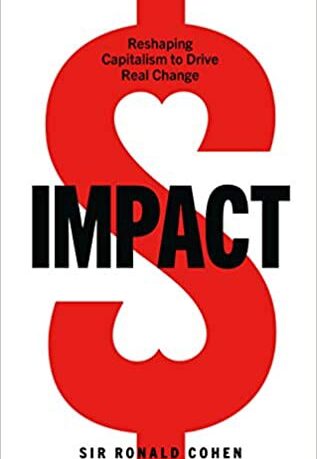There has been a noticeable shift in impact investing over the past few decades, which has seen it move from a predominantly environmentalist cause, championed largely by centre/leftist politicians, into the mainstream conversation. At Davos this year, so much of the discussions centred around notions of climate change, purpose and attaining global goals.
One person who has been at the epicentre of impact investing for several decades is Sir Ronnie Cohen. Following a successful career in banking, Sir Ronnie became Chairman of the Social Investment Task Force (SITF) in 2000 and has put his full energy into improving the lives of both individuals and society as a whole through impactful investment.
With his new book, Impact: Reshaping capitalism to drive real change, Sir Ronnie has put his learnings and ideas onto paper. He spoke at length to Alexandra Alexandra Mousavizadeh of Tortoise about his book and his vision of impact investing. Here are five messages contained within its pages:
We need solutions and Impact delivers in that respect: There are many books on capital investment and capitalism that spend time diagnosing the various problems instead of offering people clear and practical solutions. Sir Ronnie Cohen arrived in the UK from Egypt as a refugee aged 11: he studied at Oxford University and Harvard Business School, and entered into the venture capital world with the expectation that it would aid the economy by creating jobs for people. He saw first hand the level of imbalance within society, specifically the increase in the gap between the rich and the poor, and set out to find the solution himself, which led him to discover impact investment. It is clear from the book that Sir Ronnie is a solutions driven person because he has a strong personal motivation to help people receive the same opportunities that he himself had. He wants to connect impact entrepreneurs, both profit and non-profit, to capital markets and the wider investment world.
The effect of COVID19 on the future of impact investing: In a way, the timing of the book’s release couldn’t be any better as because of the pandemic people are being forced to change their way of thinking about the world, on both an individual and collective level. The existent inequality gap has been laid bare by the pandemic and with the most vulnerable as the first and largest group of people to suffer the consequences, impact investing and its accompanying tools are needed now more than ever before. Now is the moment for governments to get on board and tap into innovation, resources and capital within the private sector to ensure that we all have a chance of coming back from the crisis.
To get the best results from impact investment, big businesses have to be meaningful in their actions: As Sir Roinnie explains in the book there has been a pattern of big businesses simply following the impact trend. On the one hand, this can be seen as a positive: it shows that investors are conscious of the shift in consumer behaviour and their evolving values. Investors can then put pressure on businesses to pivot their actions. Older generations could learn a thing or two from Millenials, who know what they want when it comes to consumption, and then go and fight for equality and justice if their expectations are not being met. They are most definitely applying pressure to stakeholders within the impact revolution.
Conservative politicians are embracing impact investing: Impact explores and demonstrates how impact investing and economies can be supported by all political spectrums. In the US, Sir Ronnie outlines how there is now a significant amount of cross party support for ideas related to impact investing. Political motivations may be different – the right is more focused on outcomes and achieving results, the left likes to help those who are most vulnerable and work towards a more equal society – but the end result of impact investing benefits everyone involved.
It’s important to stay optimistic about the future of impact investing: It is obvious from the book that Sir Ronnie is an optimistic individual who believes that his positive mindset feeds into his strength of conviction to keep pushing forward in the fight for more impactful investment. This optimism comes through loud and clear in the book and serves as a useful reminder that changing a system does not happen overnight.





